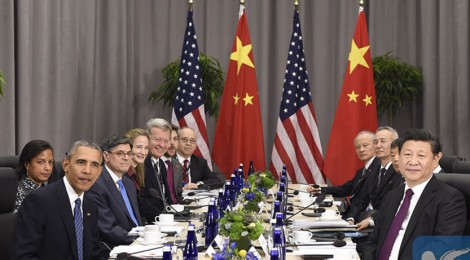
China’s role in Nuclear Security Cooperation: Xi in Washington at the NSS
The fourth Nuclear Security Summit (NSS) concluded in Washington on 1 April. Leaders from more than 50 countries and international organizations, such as the International Atomic Energy Agency and the United Nations were there. After visiting Czech Republic, also Chinese president Xi Jinping flew to the US to take part in the NSS.
The main focus of the summit was on strengthening global nuclear security architecture in order to implement a more coordinated and effective approach to the world’s lingering nuclear security challenges. Preventing global nuclear terrorism was a major topic of discussion, as well as the promotion of nuclear disarmament and non-proliferation. Evidently, North Korea and concerns related to Kim Jong-un’s nuclear intimidations have been high on the agenda.
Besides the summit meetings, what most captured the attention in Washington are the bilateral talks hold between China’s president Xi Jinping and US president Barack Obama. Last Thursday, the two leaders met for the first face-to-face since talks on the side-lines of the UN Climate Change Conference in Paris four months before. The leaders announced that they would sign a climate change accord later this month, and talked about the construction of military facilities in the South China Sea. “Our two countries have some disputes and disagreements,” Xi said, and he called for both sides to “avoid misunderstanding and misperceptions.”
 Xi and Obama found common ground on confronting the nuclear threat. In a joint statement on nuclear security cooperation, the US and China pledged to deepen cooperation and coordination to prevent nuclear smuggling and increase the security of nuclear materials. A new nuclear security Center of Excellence (COE) opened in China earlier this month thanks to close US-China collaboration, and was described by US Secretary of Energy as a “world-class facility for Chinese, regional, and international nuclear security training and technical exchanges”. The COE is the largest, most advanced and most comprehensively equipped facility for nuclear security exchanges and training in the Asia-Pacific region, capable of training 2000 people a year. It definitely represents a major achievement in the nuclear security cooperation between the two sides. President Xi Jinping said in Washington that China will build a network for capacity building on nuclear security, to carry out training of nuclear security professionals, exercises and exchanges regarding nuclear security technologies.
Xi and Obama found common ground on confronting the nuclear threat. In a joint statement on nuclear security cooperation, the US and China pledged to deepen cooperation and coordination to prevent nuclear smuggling and increase the security of nuclear materials. A new nuclear security Center of Excellence (COE) opened in China earlier this month thanks to close US-China collaboration, and was described by US Secretary of Energy as a “world-class facility for Chinese, regional, and international nuclear security training and technical exchanges”. The COE is the largest, most advanced and most comprehensively equipped facility for nuclear security exchanges and training in the Asia-Pacific region, capable of training 2000 people a year. It definitely represents a major achievement in the nuclear security cooperation between the two sides. President Xi Jinping said in Washington that China will build a network for capacity building on nuclear security, to carry out training of nuclear security professionals, exercises and exchanges regarding nuclear security technologies.
The two countries have also supported together a new round of United Nations sanctions aimed at starving North Korea of funds for its nuclear and ballistic missile programs, after Pyongyang government conducted nuclear test and launched a long-range rocket in first months of 2016. In line with the Security Council resolution, on Tuesday Beijing banned imports of gold and rare earth from North Korea, whose economy is deeply dependent on China.
Hui Zhang, a senior research associate with the Belfer Center for Science and International Affairs at Harvard University, said that, with the spectres of nuclear proliferation and even nuclear terrorism, US-China cooperation “should continue and grow stronger.” He even suggested the launch of bilateral in-depth discussions and best practice exchanges on how to increase international assurance about nuclear security conditions.
Despite the positive atmosphere, China and US still differ in their approaches toward North Korea, with Beijing favouring negotiations over sanctions, and Washington emphasising the use of pressure to bring Pyongyang to the table. The summit concluded with a China-US joint communique and five action plans defined by different actors, which, at the end of the day, represent a small victory.




